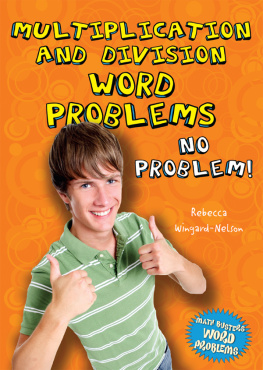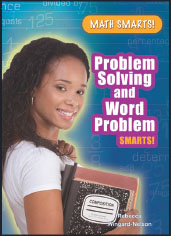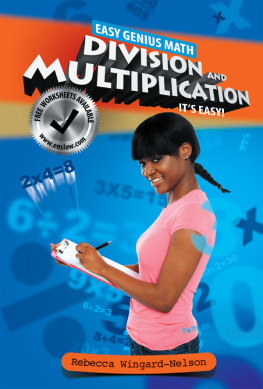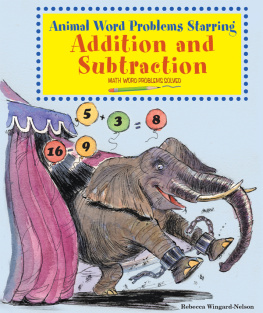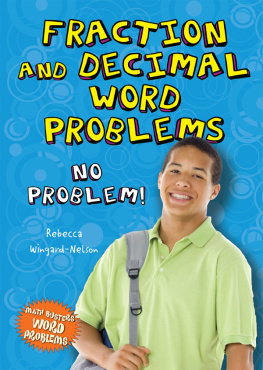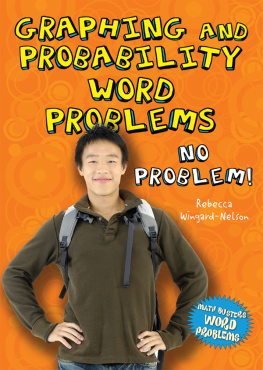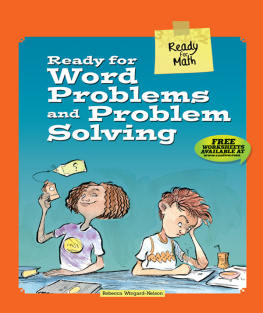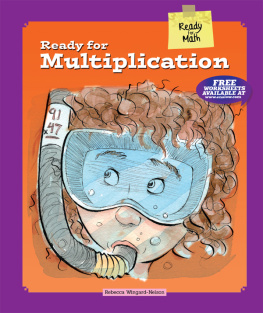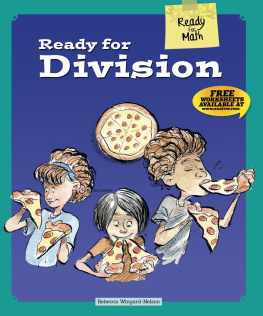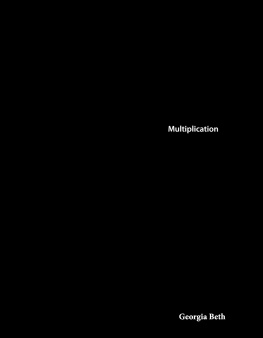Word Problems? No Problem!
Having a problem with word problems? Check out these simple ways to tackle tricky word problems with division and multiplication using real world examples. This book is great for students to use on their own, or with parents, teachers, or tutors.
FREE WORKSHEETS AVAILABLE AT ENSLOW.COM
"The author does a splendid job of clearly presenting material to help readers practice their problem-solving skills in multiplication and division."
Patricia Leonard, MS, Series Math Consultant
Middle School Math Teacher
St. Andrew School, Clifton, NJ
About the Author
AUTHOR REBECCA WINGARD-NELSON has worked in public, private, and homeschool mathematics education. She has been involved in various educational math projects, including developing and writing state assessment tests, exit exams, and proficiency tests, as well as writing and editing textbooks and workbooks.

When you spend two hours playing twenty-eight online games, you're living in a word problem! Math is everywhere; you just might not realize it all the time because math isn't always written as a math problem.
This book will help you understand how multiplication and division are used in word problems. The step-by-step method can help students, parents, teachers, and tutors solve any word problem. The book can be read from beginning to end or used to review a specific topic.

Image Credit: Shutterstock
How do I start? What do I do if I get stuck? What if the answer is wrong when I check it? Word problems are hard for me!

Image Credit: Comstock/PunchStock
You can watch a swim meet and see swimmers racing across a pool, but if you want to learn to swim, you must get in the water. Solving math problems is not a spectator sport. You may first watch how others solve word problems, but then you need to solve them for yourself, too. Go ahead, jump in!
Even the most gifted athlete or musician will tell you that in order to play well, you must practice. The more you practice anything, the better and faster you become at it. The same is true for problem solving. Homework problems and class work are your practice.
If you already know everything, there is nothing left to learn. Every mistake you make is a potential learning experience. When you understand a problem and get the right answer the first time, good for you! When you do NOT understand a problem but figure it out, or you make a mistake and learn from it, AWESOME for you!
Ask smart questions. Whoever is helping you does not know what you don't understand unless you tell them. You must ask a question before you can get an answer.
Ask questions early. Concepts in math build on each other. Today's material is essential for understanding tomorrow's.
Stuck on homework? There are many resources for homework help.
- Check a textbook.
- Ask someone who does understand.
- Try looking up sources on the Internet (but don't get distracted).
- Read this book!
Getting frustrated? Take a break.
- Get a snack or a drink of water.
- Move around and get your blood flowing.
Then come back and try again.
Stuck on a test? If you do get stuck on a problem, move on to the next one. Solve the problems you understand first. That way you won't miss the problems you do understand because you were stuck on one you didn't. If you have time, go back and try the ones you skipped.
Wrong answer? Check the math; it could be a simple mistake. Try solving the problem another way. There are many problem-solving strategies, and usually more than one of them will work. Don't give up. If you quit, you won't learn anything.
What steps can I take to solve word problems? If I follow the steps, will I be more likely to get a correct answer? Will I have less trouble finding the answer?

Image Credit: Shutterstock
Read the problem. Read the problem again. This may seem obvious, but this step may be the most important.
Ask yourself questions like:
Do I understand all of the words in the problem?
Can I restate the problem in my own words?
Will a picture or diagram help me understand the problem?
What does the problem ask me to find or show?
What information do I need to solve the problem? Do I have all of the information I need?
Underlining the important information can help you to understand the problem. Read the problem as many times as it takes for you to have a clear sense of what happens in the problem and of what you are asked to find.
Step 1: Understand the problem.
Step 2: Make a plan.
Step 3: Follow the plan.
Step 4: Review.
There are many ways to solve a math problem. Choosing a good plan becomes easier as you solve more problems. Some plans you may choose are:
| Make a list. | Guess and check. |
| Draw a picture. | Work backward. |
| Use logical reasoning. | Solve a simpler problem. |
| Use mental math. | Use a number line or graph. |
| Use a model. | Use a table. |
| Write an equation. | Use a proportion. |
Now that you understand the problem and have decided how to solve it, you can carry out your plan. Use the plan you have chosen. If it does not work, go back to step 2 and choose a different plan.
Look over the problem and your answer. Does the answer match the question? Does the answer make sense? Is it reasonable? Check the math. What plan worked or did not work? Looking back at what you have done on this problem will help you solve similar problems.
Brant's friends are spending Saturday at his house having a movie marathon. They rented 6 movies for $4 each. Each movie is about 2 hours long. How much did they pay to rent the movies?

Image Credit: Shutterstock
Read the problem. What does the problem ask you to find?
The amount Brant and his friends paid to rent the movies.
What information do you need to solve the problem? The cost to rent a movie and the number of movies that were rented.
Is there extra information? Yes. The problem tells you each movie is about 2 hours long. This information is not needed to solve the problem.
This problem tells you that it cost $4 to rent each movie. Problems that tell you a value for one item, and ask you to find a value for more than one of the same item are multiplication problems. Problems that use words such as each, every, of, per, rate, times, and multiple may be multiplication problems.
Let's write an equation.
Multiply the number of movies rented (6) by the cost of each rental ($4).
One way to write an equation is to write words first, then change the words to numbers and math symbols.

